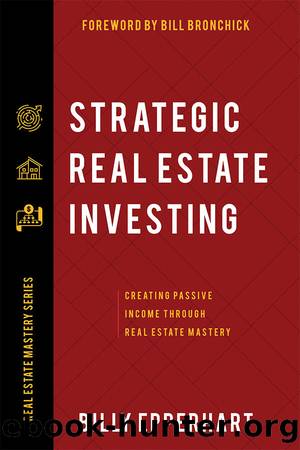Strategic Real Estate Investing by Billy Epperhart

Author:Billy Epperhart [Epperhart, Billy]
Language: eng
Format: azw3
ISBN: 9781680314809
Publisher: Harrison House Publishers
Published: 2021-01-18T16:00:00+00:00
Secret 5:
Know What Matters to an Underwriter
What actually is important to an underwriter? Well, we just went over credit scores and established that a 760 credit score and up is worth about $250,000. We call it the $250,000 credit score. It allows you to finance multiple properties.
One of the formulas I teach is to own 30 single family homes with at least a $300 positive cash flow per month after principal, interest, taxes, insurance, and management fee. You literally can get yourself into making $100,000 a year tax-free with that kind of setup. The point is that 760 score allows you to continue to buy multiple properties because it allows you to access the products that are in the mortgage industry. Of course, that credit score allows you to have greater flexibility.
The next thing an underwriter or an underwriting program would look at is your capacity. In other words, they look at what is called the debt-to-income ratio. Underwriters always factor in ratios, which displays your income capacity to repay the loan. The standard guideline is no more than 28% of your monthly gross income for your mortgage payment and no more than 36% of your gross monthly income for all debts including your mortgage payment. However, this is where the credit score comes in again. Many lenders allow higher debt ratios, especially if your credit score is good.
The first loan that investors could start with is whatâs called the full doc loan or a full documentation loan. On this particular loan, they will ask you for documents like your past two years of tax returns and your past two monthsâ of pay stubs or checking account statements. They will also do a verification of employment (VOE) and or verification of your assets (VOA).
Theyâre looking for âseasoned funds,â which are the funds that would be used for your down payment and six months of mortgage payments. They want to see these funds âseasonedâ or have been at that particular balance in your name for the past 60 days. Sometimes, they will do whatâs called an average balance to determine that the funds have been sitting there for at least 60 days.
After a real estate investor has purchased five to 10 properties in his or her name, itâs wiser to go from a full doc loan to a stated income loan. If youâre self-employed or a business owner, you may start off with a stated income loan. Let me explain how that works. The loan is typically classified as a stated income/verified asset loan. A real estate investor will do this loan as they begin to accumulate more and more properties.
The self-employed and business owners receive a 1099 for their income. Most of the time, stated income is not accepted if you are not a business owner or self-employed. If youâre a beginning investor, you need to be careful about how your income is stated.
If youâre more sophisticated with multiple properties, lenders will allow you to state your income at whatever it needs to be so the debt-to-income ratio is satisfied based on all your debts.
Download
This site does not store any files on its server. We only index and link to content provided by other sites. Please contact the content providers to delete copyright contents if any and email us, we'll remove relevant links or contents immediately.
Zero to IPO: Over $1 Trillion of Actionable Advice from the World's Most Successful Entrepreneurs by Frederic Kerrest(4490)
Machine Learning at Scale with H2O by Gregory Keys | David Whiting(4289)
Never by Ken Follett(3928)
Harry Potter and the Goblet Of Fire by J.K. Rowling(3839)
Ogilvy on Advertising by David Ogilvy(3591)
Shadow of Night by Deborah Harkness(3352)
The Man Who Died Twice by Richard Osman(3059)
Book of Life by Deborah Harkness(2919)
The Tipping Point by Malcolm Gladwell(2903)
Will by Will Smith(2898)
0041152001443424520 .pdf by Unknown(2841)
My Brilliant Friend by Elena Ferrante(2812)
Purple Hibiscus by Chimamanda Ngozi Adichie(2806)
How Proust Can Change Your Life by Alain De Botton(2795)
How to Pay Zero Taxes, 2018 by Jeff A. Schnepper(2641)
Hooked: A Dark, Contemporary Romance (Never After Series) by Emily McIntire(2538)
Rationality by Steven Pinker(2345)
Can't Hurt Me: Master Your Mind and Defy the Odds - Clean Edition by David Goggins(2316)
Borders by unknow(2300)
